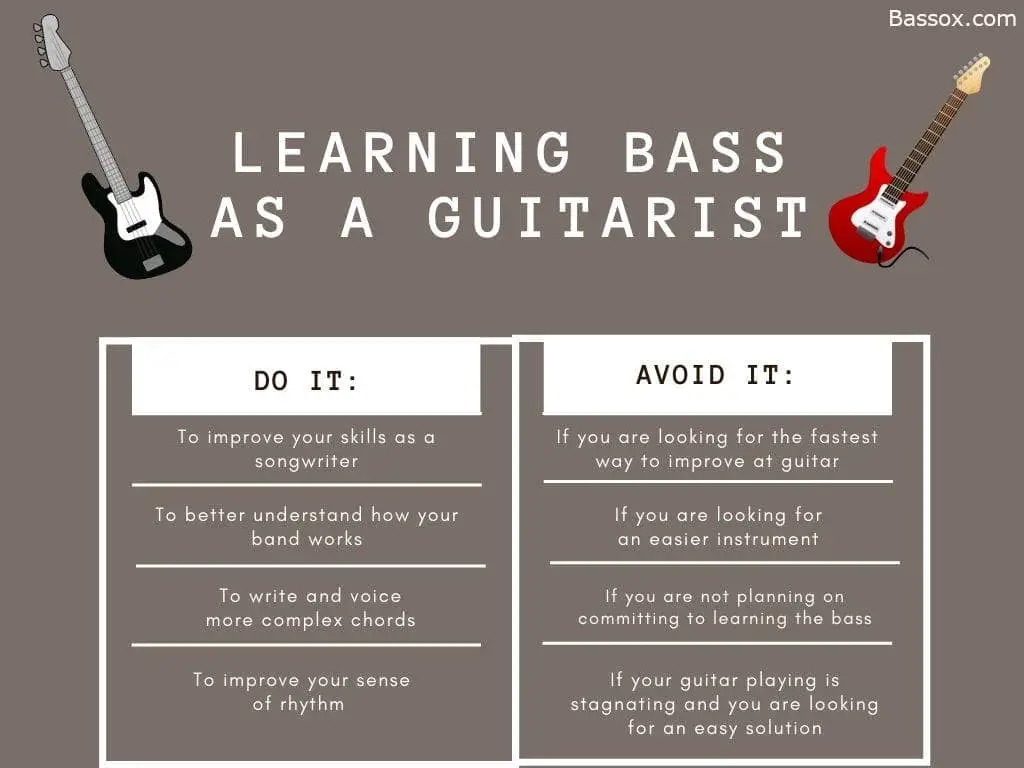I mainly consider myself a bassist and have done so for the last 14 years. I also enjoy playing the guitar from time to time too. Upon learning that I play both instruments, bassists and guitarists alike tend to ask me the same question: Will playing bass make me a better guitar player?
Playing bass will make you a better guitar player. The Bass improves your finger strength and fluidity, as well as your rhythmic sense and understanding of musical theory in ways the guitar doesn’t. However, learning bass is not a faster way to improve as a guitar player than by simply practicing guitar.
Playing bass is great for learning skills you otherwise wouldn’t have learned while playing guitar. However, If your main goal is to just get as good as possible as fast as possible on the guitar, I don’t recommend picking up the bass.
Thus, how you should approach guitar and bass depends largely on your goals and current skill level. Read on to learn what you should consider when deciding whether you should play guitar, bass, or both.
Will learning bass make me a better guitarist?
The fastest way to get better at guitar is to practice the guitar.
Still, learning bass will teach you some valuable skills that you otherwise wouldn’t as a guitarist. Here are the 5 most noteworthy ones:
- Finger Strength – Medium guitar strings range from 0.011 to 0.050, while medium bass strings range from 0.045 to 0.105. Thus, the thicker strings on the bass guitar will improve your finger strength faster than on the guitar. Finger strength has many non-obvious benefits, and in my experience, it is especially helpful for playing heavy riffs and bar chords.
- Finger Dexterity – The thicker strings and the large space between them will also improve your finger dexterity in a different way than on the guitar. Whenever I play the guitar and pick up the bass afterward, my fretting hand always feels super light. As a result, playing fast riffs feels easy and natural. I also have better reach due to having stretched my fingers further on the bass. Thus, playing bass will improve your reach and the speed of your fretting hand.
- Rhythm – The role of the bassist is to provide rhythm and groove to a song. By writing and playing groovy bass lines as a guitarist, you will be able to carry some of these skills over to your guitar playing as well. Mainly, you might experience your playing becoming tighter. You might also start seeing more rhythmic possibilities in your playing through different strum patterns and by playing muted strings.
- Music Theory – Knowing music theory is helpful for playing the bass and the guitar. Yet, the type of theory needed is vastly different. On the bass, you need to know when to hold down a root note, and when and how you can add a more melodic groove to a song. As a guitarist, this will give you a better understanding of how to structure and voice your chords. Once you understand how the bass dictates what chords you can and cannot play, your guitar playing will also become more sophisticated.
- Composing – Lastly, the more instruments you master, the better you will be at composing music. This is especially useful in genres with lineups that only consist of guitars, bass, and drums. By understanding both how the bass and guitar work, you will also greatly improve your understanding of why a band sounds the way they do. As your grasp of how the bass and guitar impact one another and a band as a whole improves, you will also improve at composing music.

Should I learn bass as a guitarist?
You should learn bass as a guitarist if you want to improve your songwriting and your understanding of how your band works. It is not a good idea to learn bass as a guitar player to strictly improve your technical proficiency as a guitarist.
The guitar and bass are vastly different instruments. Learning to play bass should thus never be a quick solution to the issues you are facing as a guitar player. I made this simple table to clearly showcase the main reasons to learn or avoid the bass:

So if are finding guitar difficult at the moment, learning the bass is not going to solve your issues. If you pick up the 4-string to solve these types of issues it will ultimately lead to you becoming even more frustrated and burned out.
Therefore, only pick up the bass if you want to improve as a musician and songwriter, and if you are willing to put in the hours needed to get good at it.
Is it harder to play guitar or bass?
The second question I tend to get when people see that I play guitar and bass is: Is playing bass easier than guitar?
As a general rule, the bass is easier to pick up but harder to master than the guitar. Getting good at bass requires rhythm, groove, and an understanding of how other instruments work. The guitar is more dependent on dexterity, and understanding of chords, melodies, and harmonies.
The bass has a reputation for being an easy instrument. While playing root notes isn’t the most complicated thing in the world, there is a lot that goes into what makes a good bass player.
Notably, deciding whether to play a simple groove or a complicated melodic one is difficult and has a massive impact on what a song will sound like.
Sure, a bass player can get away with playing really simple lines, but without the experience and understanding of when this is fitting, the bassist can do a lot of harm to a song. This is why, while easy to pick up, the bass is a difficult instrument to master.
The bass is thus not an easier instrument than the guitar, but they do require different skills. Here are the most notable differences:
| Skill required | Bass | Guitar |
| Picking up the instrument: | Easier | Harder |
| Mastering the instrument: | Harder | Easier |
| Requires understanding: | Of rhythm and what the other instruments are doing in the band | Of Harmonies, melodies, and chords |
| Main role in a band: | Creating a groove that bridges the gap between the percussion and the melodic instruments | Providing rhythmic drive and harmonies through chords. Providing melodies and solos through leads |
| Fretting hand: | Quickly switching between many individual notes when playing grooves | Switching between multiple notes at once when playing chords |
| Solo: | Being able to make other musicians shine | Knowing when and how to shine yourself |
Succeeding as a bassist also requires you to possess a fitting personality. Find out if you are cut out to be a bassist by reading my list of the 5 essential personality traits for bassists.
Conclusion
Playing bass will make you a better guitar player. However, this doesn’t mean that all guitarists should pick up the bass.
Picking up any instrument is a big decision and requires commitment. There is little to be gained from picking up the bass and giving up on it a couple of weeks later. Thus, despite their similarities, you should carefully consider whether picking up the bass is right for you or not.
With that said, playing both the guitar and the bass has a lot of advantages. For me, it has increased my understanding of rock, metal, and pop greatly. I have also improved as a songwriter in ways I couldn’t have if I hadn’t played both instruments.
Only you know what you want to achieve musically. Therefore, use the info in this article to make an informed decision on whether playing both the guitar and bass is the right decision for you.

